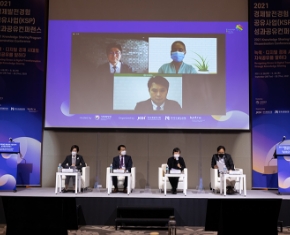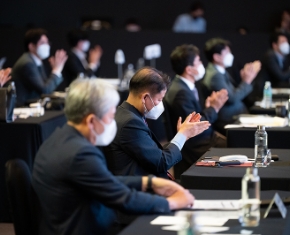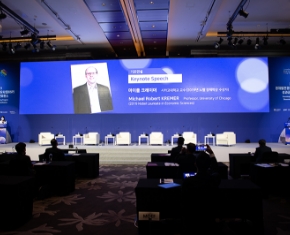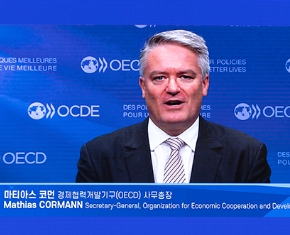2020/21 KSP
Knowledge Sharing Program (KSP) is a platform for development cooperation, aiming to share knowledge with partner countries and develop a solid foundation for the expansion of economic cooperation based on Korea's development experience and expertise.
Our mission is to support the sustainable socioeconomic development of partner countries, promote strong and close economic cooperation, and contribute to the mutual prosperity of the international community.
※ 2021 KSP Annual Report mainly presents 2020/21 KSP projects that were launched in 2020 and completed in 2021.



History
-
2021
- Released KSP Advancement Strategy for increasing Korea’s soft power (the 224th Ministerial Meeting on International Economic Affairs)
- Project for building a national medical complex in Uzbekistan interlinked with EDCF
- Developed the 2021-2015 digital transformation plans for Belarus developed and launched a digital platform for smart industries
-
2020
- Launched the Economic Innovation Partnership Program (EIPP) (with Myanmar, Uzbekistan, and Indonesia)
- Feasibility study for building a Digital Media City in Konza, Kenya followed with EDCF
- Joint cooperation project for e-government with Ministry of Interior or Serbia
-
2019
- Korea-Myanmar economic cooperative industrial complex followed up
- Established Romanian Productivity Centre
-
2018
- Opened the GKEDC
- Intelligent traffic system project in Kenya linked with EDCF
- Established of ICT hubs for secondary education in Sri Lanka linked with EDCF
-
2017
- Announced KSP 2.0 (the 191th Ministerial Meeting on International Economic Affairs, support for economic cooperation with emerging countries)
- KOICA project to support Vietnam-Korea Institute of Science and Technology (VKIST) linked with KSP
- Project for enhancing housing guarantee system and management of Kazakhstan
-
2016
- Implemented cross-departmental partnerships
- Established CAI Center in Mexico for Promoting HRD
- Exported patent information system to UAE
-
2015
- The 10th anniversary of KSP publications
- Initiated multilateral policy suggestion projects (Visegrád Group, V4)
- Follow-up project to build a development research institute in Myanmar with KOICA
- Implementation of Broadband Project in Nicaragua co-financed by EDCF-IDB
-
2014
- Reorganized project structure to be promoted by sector (economy, industry/trade, construction/infrastructure)
- Implementation of railway electronic interlocking system in Nagh Hamady-Luxor, Egypt co-financed by EDCF-WB
-
2013
- Initiated system consulting (2013-2016, 25 projects)
- Launched OECD Knowledge Sharing Alliance (KSA)
- Master plan for capacity building of Colombia’s science and technology parks jointly pursued with KOICA
-
2012
- Launched policy advisor dispatch system
- Held the 1st KSP Regional Seminar (Eastern Europe, Asia, and Latin America)
- Hosted Korea-WB KSP Forum
- Launched Young KSPians (2012-2017)
- Follow-up project on building a waterworks system in Bandung Indonesia with KOICA
-
2011
- Began joint consulting with international organizations (WB, ADB, IDB, and UN-APCICT)
- Adopted Senior advisor system
- Announced KSP Development Measures (ODA Korea)
- Implemented 2011-2020 Ten-year Socio-Economic Development Strategy of Vietnam
-
2010
- Launched modularization project of Korea’s development experiences (2010-2015, 148 projects)
- Korea joined OECD Donor Assistance Committee (DAC)
-
2009
- KSP selected as National Flagship Program (Economic Development with Korea)
- Initiated Strategic development partner projects
- Enhancing electric power system of the Dominican Republic project followed up with IDB and contracted by a Korean enterprise
-
2008
- Established Navoi Free Economic Zone in Uzbekistan
-
2007
- Expanded KSP partnership region (high income countries and emerging economies)
-
2006
- Held the 1st KSP Dissemination Seminar
- Established export credit agency for Vietnam
-
2004
- Launched bilateral policy consultation projects(Vietnam and Uzbekistan)
Partner Countries and International Organizations
Since launched in 2004, the KSP has established partnership with 87 partner countries and 11 international organizations by 2021 and
expanded to become a knowledge sharing platform driving sustainable growth.

-
 18 ASIA
18 ASIA- Association of Southeast Asian Nations (ASEAN)
- Bangladesh
- Bhutan
- Cambodia
- China
- India
- Indonesia
- Lao PDR
- Malaysia
- Mekong River Commission(MRC)
- Mongolia
- Myanmar
- Pacific Islands Forum(PIF)
- Pakistan
- Philippines
- Sri Lanka
- Thailand
- Timor-Leste (New partner country)
- Vietnam
-
 19 CIS & Europe
19 CIS & Europe- Albania (New partner country)
- Armenia
- Azerbaijan
- Belarus
- Bulgaria
- Georgia
- Hungary
- Kazakhstan
- Kyrgyz Republic
- Moldova
- Romania
- Russia
- Serbia
- Tajikistan
- Türkiye
- Ukraine
- Uzbekistan
- Visegrad Group (V4)
-
 12 MIDDLE EAST AND NORTH AFRICA
12 MIDDLE EAST AND NORTH AFRICA- Algeria
- Egypt
- Iran
- Iraq
- Jordan
- Kuwait
- Libya
- Morocco
- Oman
- Saudi Arabia
- Tunisia
- United Arab Emirates
-
 16 AFRICA
16 AFRICA- Angola
- Democratic Republic of Congo
- Equatorial Guinea
- Ethiopia
- Gabon
- Ghana
- Kenya
- Mozambique
- Nigeria
- Partnership for skills in Applied Sciences Engineering and Technology (PASET)
- Rwanda
- South Africa
- South Sudan
- Tanzania
- Togo (New partner country)
- Uganda
-
 22 LATIN AMERICA AND THE CARIBBEAN
22 LATIN AMERICA AND THE CARIBBEAN- Argentina
- Barbados
- Belize
- Bolivia
- Brazil
- Chile
- Colombia
- Costa Rica
- Cuba
- Dominican Republic
- Ecuador
- El Salvador
- Guatemala
- Haiti
- Honduras
- Jamaica
- Mexico
- Nicaragua
- Panama
- Paraguay
- Peru
- Uruguay
International Organizations
 African Development Bank
African Development Bank
(AfDB) Asian Development Bank
Asian Development Bank
(ADB) Central American Bank for Economic Integration
Central American Bank for Economic Integration
(CABEI) Development Bank of Latin America
Development Bank of Latin America
(CAF) European Bank for Reconstruction and Development
European Bank for Reconstruction and Development
(EBRD) Global Green Growth Institute
Global Green Growth Institute
(GGGI) Inter-American Development Bank
Inter-American Development Bank
(IDB) International Trade Centre
International Trade Centre
(ITC) Organization for Economic Co-operation and Development
Organization for Economic Co-operation and Development
(OECD) United Nations Asian and Pacific Training Centre for Information and Communication Technology for Development
United Nations Asian and Pacific Training Centre for Information and Communication Technology for Development
(UN-APOCT) World Bank
World Bank
(WB Group)
Project Status 2004-2021
Changes in Projects and Consultation Topics
Changes in Partner Countries and International Organizations
※ Since 2015, the annual KSP projects have initiated in August/October to end around the same time of the following year. Accordingly, the years of X-axis represent the years in which KSP projects launched (e.g. 2020 -> 2020/21 KSP)
Project Status 2004-2021
Number of Consultations by Region
-
Asia

488 projects
-
Latin America and the Caribbean (LAC)

318 projects
-
CIS·Europe

141 projects
-
Sub-Saharan Africa (SSA)

163 projects
-
Middle East and North Africa (MENA)

141 projects
Partner Country with Most KSP Projects by Region
-
 Vietnam
ASIA
Vietnam
ASIA
41 projects
104 consultations
-
 Mexico
LAC
Mexico
LAC
13 projects
38 consultations
-
 Uzbekistan
CIS ∙ Europe
Uzbekistan
CIS ∙ Europe
19 projects
59 consultations
-
 Ethiopia
SSA
Ethiopia
SSA
15 projects
36 consultations
-
 Egypt
MENA
Egypt
MENA
8 projects
26 consultations
KSP Trends
The global economy grew 6.1 percent in 2021, recording a 9 percent growth compared to a year ago, as many countries are overcoming the adverse impact of the COVID-19 pandemic. Amid the recovery, the world needs to strengthen socioeconomic resilience and address global challenges collectively. In this setting, the 2021/21 KSP conducted many policy consultations on preventive measures with an aim to secure tools for mid- to long-term growth, reflecting the changing needs from partner countries. Accordingly, this year’s annual report introduces example cases in three major categories: “inclusion” for maintaining safe and healthy life of the people in partner countries; “co-prosperity” for ensuring balanced business ecosystem and building physical infrastructure in order to promote socioeconomic development; and “innovation” for bolstering digital competitiveness as a basis for productivity increase in each sector. The Dissemination Conference also serves as an example of reinforcing the existing “partnership” system based on sharing KSP results with relevant stakeholders from Korea and abroad. The Report also covers the KSP strategic studies for systematic project identification, planning, and operation.
The MOEF also announced the “KSP Advancement Strategy” to develop the Program as a co-prosperous knowledge sharing platform for spreading Korea’s soft power with the purpose of active response to changes in the domestic and global environments and various project needs. Based on comprehensive review on the history, current status, and evaluations of the KSP, three major directions and 10 key projects have been selected to lay the foundations for self-reliance of the partner countries and facilitate the bilateral economic cooperation. The MOEF and the coordinating agencies will implement the reinforcement strategy in earnest to help secure a basis for sustainable growth and reinforce economic partnership by sharing knowledge.
The COVID-19 pandemic is the most significant global crisis of our time. And the value of knowledge sharing is drawing attention. To form a solid response in an era of great volatility, effective knowledge sharing is desperately needed. “Knowledge Sharing Program” of South Korea is leading the way. Korea’s effective policy response to COVID-19 has attracted global attention followed by requests for knowledge sharing from the global community. KSP as the leading platform for sharing Korea’s knowledge and policy experience, is now gaining worldwide attention. KSP as the leading platform for sharing Korea’s knowledge and policy experience, is now gaining worldwide attention. KSP is a platform for development cooperation, aiming to provide customized policy solutions based on Korea’s development experience. Through KSP, we contribute to the achievement of co-prosperity across the international community not only by supporting socio-economic development of our partners, but together by exploring opportunities for bilateral economic cooperation. KSP now offers virtual policy consultation services crossing the boundaries of time and space In the year 2020, KSP is currently being implemented in 47 countries on 90 projects.
Adapting to the contact-free circumstances, the final results are now being conveyed to our partners in a more flexible and sound manner. Since the global spread of COVID-19, KSP has identified the demand for Korea’s COVID-19 response model. And we have swiftly designed new projects to seek out comprehensive solutions. we need new policy design that would suit in post-COVID-19 era. The role of KSP is becoming ever more important to provide customized solutions in resolving policy needs. From industry, science and technology to public administration and health among others, KSP is being implemented in diverse socio-economic areas with both emerging and advanced countries.Since its launch in 2004, more than 1,200 KSP projects have been conducted worldwide and ranslated into great achievements.
In addition, by launching “Economic Innovation Partnership Program”, a new model for knowledge sharing, we will accelerate effective bilateral economic cooperation on development of large-scale infrastructure. Changes that we could not have foreseen are rapidly reshaping our daily lives.Customized solutions, economic cooperation that brings mutual prosperity, and effective measures to overcome crisis situation Together with KSP, it’s possible to make the leap. Your Knowledge Partner, KSP
2020/21 KSP Trends
By Region
50 projects in total 36 countries in total
-
Asia
- 14
- 9
-
Sub-Saharan Africa
- 7
- 5
-
LAC
- 19
- 14
-
CIS·Europe
- 10
- 8
By Sector
-
Economic Development (24 projects)
-
 Territorial Development
11projects
Territorial Development
11projects
-
 Science and Technology
6projects
Science and Technology
6projects
-
 Industrial and Trade Policy
4projects
Industrial and Trade Policy
4projects
-
 Rural Development
2projects
Rural Development
2projects
-
 Macro and Financial Policy
1project
Macro and Financial Policy
1project
-
-
Social Policy (14 projects)
-
 Environment
8projects
Environment
8projects
-
 Health and Welfare
5projects
Health and Welfare
5projects
-
 Human Resources Development
1project
Human Resources Development
1project
-
-
Public Policy (12 projects)
-
 Public Administration
9projects
Public Administration
9projects
-
 Public Finance
3projects
Public Finance
3projects
-
KSP Trends
KSP Advancement Strategy
The MOEF has unveiled the strategy to reinforce KSP to expand Korea's soft power to efficiently respond to changing needs from partner countries and other environmental changes and to accelerate spread of the soft power of Korea.*
* the 224th Ministerial Meeting on International Economic Affairs on September 27, 2021, third item on the agenda
-
-
Vision
-
Building a Co-prosperous Knowledge Sharing Platform for Spreading Korea’s Soft Power
-
-
-
Objective
-
-
Lay foundations for self-reliance of partner countries through capacity building
- Sharing development experience Focus on partner country demand and new areas with advantages for Korea
-
Facilitate bilateral economic cooperation, including Korean enterprises expanding overseas
- Policy consultations Emphasis on consultations for project connected with new market expansion
-
-
-
-
3 Major Directions
-
-
Achieving Tangible Outcomes of Korea’s Soft Power
- Systematic and customized consultation topics
- Multi-year, large-scale consultations
- Support for follow-up projects
- Post evaluation and feedback system
-
Globalization of Korea’s Soft Power
- Increasing participation of partner countries and international financial institutions
- Building an efficient consultation delivery system
- Committed outreaching
-
Systematic Change to Further Spread Korea’s Soft Power
- Foundation for flexible project promotion
- Linking with other knowledge sharing programs
- KSP governance enhancement
-
-
-
-
10 Key Projects
-
-
- Promote public-private project proposals
- Launch KSP Plus
- Link with EDCF‧IO trust funds
- Issue certificates for high performing institutions
-
- Increase non-ODA consultation ratio
- Implement KSP modulization 2.0
- Begin KSP internship
-
- Increase emergency project proposals
- Building leading platform for knowledge sharing
- Enact act on knowledge sharing projects (tentative title)
-
-
2020/21 KSP
Key Consultation Projects
Inclusion
Support for the Establishment of National Strategies to Enhance the Contagious Disease Prevention
 Paraguay
Paraguay-
- Capital Asunción
- GDP per Capita USD 5,001
- Area 397,300㎢
- Population 7.13 million
- Partner Institution Ministry of Public Health and Social Welfare

-

 Korea’s Relevant Experience
Korea’s Relevant Experience- First established in 2015 following the MERS outbreak, the infectious disease control system helped ensure proper response to the COVID-19 pandemic. The quarantine governance, or “K-quarantine” has widely established.
- A robust national quarantine system was in operation in 2020, including the 24/7 Emergency Operations Center and the Rapid Response Team for suspected cases. The Korea Centers for Disease Control and Prevention was promoted to the Korea Disease Control and Prevention Agency (June 2021). Regional Centers for Disease Control and Prevention was in all cities/provinces across the nation in 2020. Epidemiological investigators were secured in 2015.
- A strategy to globally standardize K-Quarantine’s 3T (Test-Trace-Treat) was suggested (2020).
-

 Background
Background- As the pandemic continued, Paraguay began to face the limitations, caused by the lack of healthcare professionals and infrastructure. And the country was also experiencing various socioeconomic problems such as slow economic growth, economic instability of the people, and increasing unemployment.
- The Paraguayan Ministry of Public Health and Social Welfare (MSPBS) applied for a KSP project to learn from Korea’s experience of implementing a quarantine system and to establish effective and well-structured public health and infectious disease response policies.
-
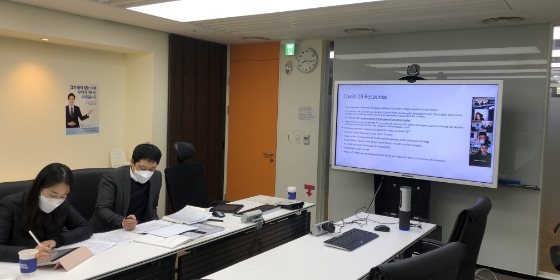
 Consultation Topics and Progress
Consultation Topics and Progress - Integration and interlinking of the contagious disease prevention network, strengthening public health systems, and implementing customized disease prevention system in Paraguay.
- The participation of high-ranking officials including the then-Minister of the MSPBS Julio Daniel Mazzoleni, the Vice Minister of the MSPBS Lida Sosa in every phase enabled a successful implementation of the project.
- Amid the spread of COVID-19, The as-is diagnosis was executed by Yonsei Global Health Center Asuncion Branch, the local branch of the implementation agency. The training for policy practitioners has been conducted twice: 1) online policy workshop and 2) action plan briefing session for the public officials of the National Institute of Health.
-
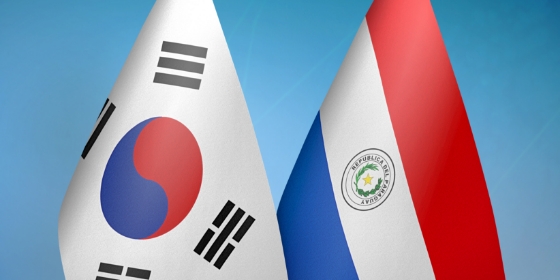
 Tentative Outcomes
Tentative OutcomesCapability building for partner country
- Contribution to increasing infection/disease control and healthcare capabilities of Paraguay
Promoting development cooperation
- Paraguay government in review of EDCF infrastructure project plan (including CDC establishment)
Inclusion
Capacity Building for the Response of COVID-19 and other Epidemics in Mozambique
 Mozambique
Mozambique-
- Capital Maputo
- GDP per Capita USD 449
- Area 770,880㎢
- Population 31.26 million
- Partner Institution Ministry of Health

-

 Korea’s Relevant Experience
Korea’s Relevant Experience- System for infectious disease management was established across the country.
- An automated Epidemiological Investigation Support System was adopted for COVID-19.
- 63 life centers are in operation with dedicated medical professionals for the life/medical support of patients with mild symptoms.
- Stricter immigration process at airports and a pre-survey of disease-related information via Q-System
-

 Background
Background- The Government of Mozambique has declared a national emergency after the first case of the COVID-19 in the country. Despite the effort, the country was facing difficulties in responding to the pandemic due to insufficient the nation’s healthcare and quarantine response system and incorrect perception of the virus.
- Mozambique Ministry of Health (MISAU) applied for the KSP in order to improve the nation’s healthcare and quarantine response system including diagnosis, tracing, and treatment for infectious diseases
-
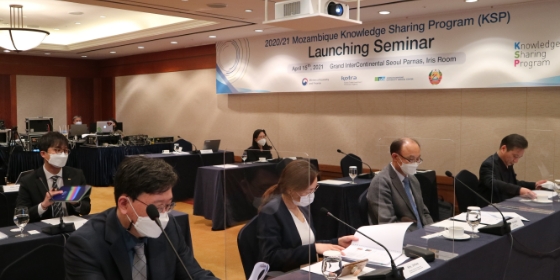
 Consultation Topics and Progress
Consultation Topics and Progress - Epidemics, infectious disease management, and epidemiological investigation of the MISAU
- The Head of Ministry of Health National Institute of Health (INS) Ilesh Jani and other key high-level stakeholders actively expressed opinions on the project and discussed collaboration between both parties.
- Due to the COVID-19 pandemic, videoconferencing and written survey with the MISAU and other related agencies, communication with local experts, and other alternative measures have been implemented for six weeks instead of site visits.
-
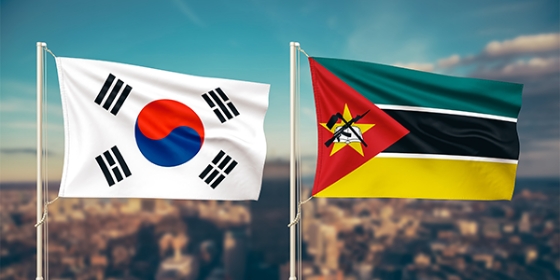
 Tentative Outcomes
Tentative OutcomesPromoting private economic cooperation
- A Korean diagnosis kit producer PCL exported 5,000 testing kits to a Company K, a vendor under the MISAU, under the initial contract (worth around USD 1,000). An additional contract of USD 7,600 was signed after the project, with an increased credibility in Korean products.
Inclusion
Flood and Drought Management and Communication in the Mekong River Commission
 Mekong River Commission
Mekong River Commission-
- Headquarter Vientiane, Lao PDR
- Establishment 1995
- Member Countries (GDP per Capita) Cambodia (USD 1,544), Lao PDR (USD 2,630), Thailand (USD 7,187), Vietnam (USD 2,786)
- Area of Lower Mekong Basin 7.95 million ㎢

-

 Korea’s Relevant Experience
Korea’s Relevant Experience- Korea has been promoting integrated water management, centered on the Ministry of Environment, for flood/drought management since 2018. It will make a transition to IoT and AI-based flood forecast system by 2025.
-

 Background
Background- The Mekong River Commission (MRC) established a cooperation mechanism for utilizing and developing the transboundary river. However, various technical and policy factors have hindered effective flood/drought management.
- The Mekong River Commission Secretariat (MRCS) and its member countries applied for a KSP project to unify water management system and efficiently respond to floods and drought by forming a communication channel that delivers timely forecasts and warnings.
-
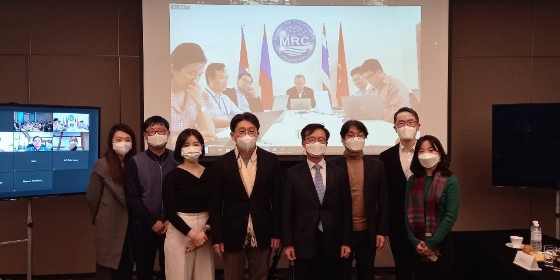
 Consultation Topics and Progress
Consultation Topics and Progress - Experience and implications of integrated flood and drought management in Korea, Cambodia, Laos, Thailand, and Vietnam
- Flood prediction using AI and big data technologies
- Floods and drought prediction/warning communication system in MRC
- Integrated flood and drought management strategy in Mekong region
- Key participants from the MRCS and member countries including the then-CEO of MRCS An Pich Hatda and the Chief Strategy and Partnership Officer of the MRCS at that time Anoulak Kittikhoun (current CEO of MRCS) actively shared opinions while attending the reporting sessions participated in the project and shared opinion.
- Amid a surge in new COVID cases, face-to-face activities were replaced to various alternatives methods with local experts and virtual meetings. In particular, educational videos on relevant Korean experiences were made for the Policy Practitioners' Workshop to expand cooperation with multiple Korean agencies.
-
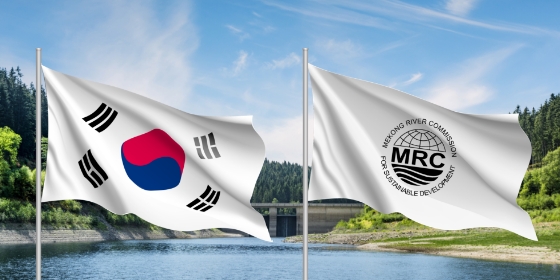
 Tentative Outcomes
Tentative OutcomesPromoting development cooperation
- To be followed up with a 2022/23 KSP project (“Flood and Drought Management and Communication in the Mekong River Commission”)
- Contribution to the launch of Korea-ASEAN Ministerial Meeting on Disaster Management (minister-level conference) (to be held in 2022)
Co-prosperity
Supporting SMEs' Integration in GVC of Automotive Industry in Pakistan
 Pakistan
Pakistan-
- Capital Islamabad
- GDP per Capita USD 1,189
- Area 770,880㎢
- Population 220.89 million
- Partner Institution Small and Medium Enterprises Development Authority

-

 Korea’s Relevant Experience
Korea’s Relevant Experience- Support for exports of SMEs began through global marketing and the small and medium business framework was established in the late 1990s.
- Today, various support businesses are in place to increase presence of SMEs in the global value chain (GVC).
-

 Background
Background- SMEs in the country constitute nearly 99 percent of the entire business sector, but have weak competitiveness due to poor quality, lack of standards, equipment aging, insufficient human resource and lack of expertise.
- Small and Medium Enterprises Development Authority (SMEDA) requested for a KSP project with aims to benchmark Korea’s example cases of developing inter-linkages between large enterprises and SMEs especially in the automotive industry of Korea and experience in policy making in promoting local SMEs' integration into GVC throughout Korean economic growth.
-
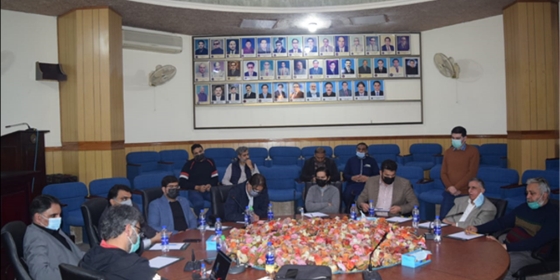
 Consultation Topics and Progress
Consultation Topics and Progress - Large-small enterprise collaboration: policy roadmap for increasing competitiveness of SMEs, measures to promote SMEs to integrate into GVC, enhancing 3 major industries (textile/garments, home appliances, and surgical equipment)
- Policies for automobile localization in Pakistan: enterprise support, technology development, and infrastructure establishment
- The Vice President of SMEDA Nadia Jahangir Seth expressed her gratitude for the partnership for the development of the automotive sector and highly appreciated the project being much more than suggestions and continuing with a follow-up plan.
- As cross-border movements were restricted amid the pandemic, all the stages were implemented through multiple alternatives such as virtual meeting, focus group, individual interviews and experts session.
-
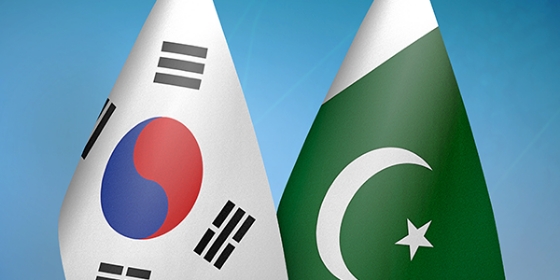
 Tentative Outcomes
Tentative OutcomesPromoting private economic cooperation
- The 2021 Korea-Pakistan future car industry collaboration event in connection with the KSP project with 15 consultations and 2 MOUs made on EV/batteries
Promoting development cooperation
- Korea Institute for Advancement of Technology (KIAT) and Hyundai Research Institute promoting ODA to follow up on “Establishment of Pakistan Green Car Center”
- Korea Energy Agency and Hyundai Research Institute preparing to apply for an ODA project for “Masterplan of EV Charging Infrastructure in Pakistan”
Co-prosperity
Support for Operation of the Integrated Traffic Management Center in Nairobi Metropolitan Region, Kenya
 Kenya
Kenya -
- Capital Nairobi
- GDP per Capita USD 1,879
- Area 569,140㎢
- Population 53.77 million (Nairobi: 10.41 million)
- Partner Institution Kenya Urban Roads Authority

-

 Korea’s Relevant Experience
Korea’s Relevant Experience- Korea has implemented the Intelligent Transportation System (ITS) in several stages to address traffic issues following industrialization and urbanization.
-

 Background
Background- Traffic demand in Nairobi, Kenya’s capital city, has been increasing amid rapid urbanization and rising income. However, the city is faced with increasing traffic congestion and car accidents due to the lack of transportation infrastructures and insufficient traffic management.
- Kenya Urban Roads Authority (KURA) requested a KSP project to adopt efficient road traffic management measures based on Korea's successful ITS implementation and operation experience.
-
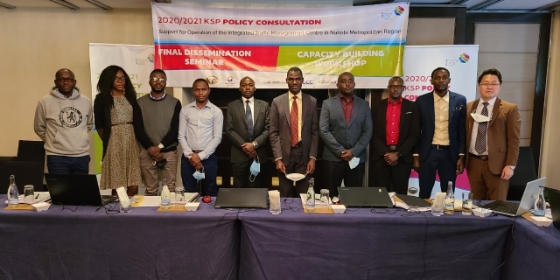
 Consultation Topics and Progress
Consultation Topics and Progress - Integrated operation measures of the metropolitan traffic control center (road network monitoring, traffic signal operation/management, road information provision, and key performance index development), automatic enforcement system development for traffic violations, emergency guidelines setting, emergency vehicle priority signal system implementation, and policy and technical proposals for linking with public transportation
- General Manager of KURA Silas M. Kinoti actively shared opinions while attending all reporting sessions throughout the project, expressing KURA’s great interest in the project.
- While overseas business trips being restricted, the In-depth Study was conducted through the local branch of the implementing agency and the other activities were implemented virtually.
-
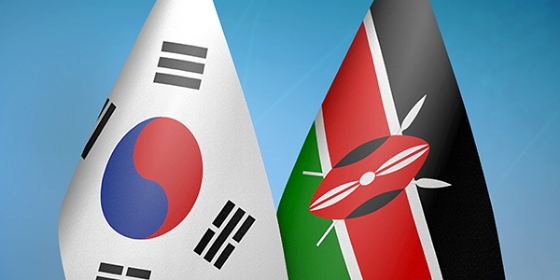
 Tentative Outcomes
Tentative OutcomesPromoting development cooperation
- To be followed up with the newly launched TMC operations under the EDCF project (“Nairobi ITS Establishment and Junctions Improvement Project (Phase I and II)”, 2021-2023, USD 61 million)
Co-prosperity
[IDB] Designing a Smart City Strategy for La Ceiba, Honduras
 Honduras
Honduras-
- Capital Tegucigalpa
- GDP per Capita USD 2,389
- Area 111,890㎢
- Population 9.9 million
- Partner Institution Office of Compliance of the Presidential Affairs and Priorities

-

 Korea’s Relevant Experience
Korea’s Relevant Experience- Korea has promoted comprehensive plans for smart city development with details for each 5 years since 2009. Collaboration with local authorities helped build a smart city especially in newly developed urban areas and expand ICT infrastructure.
-

 Background
Background- The Government of Honduras took steps to transform La Ceiba, Honduras’ third largest city, into a smart city. However, the efforts have been challenged by the lack of capabilities and budgets of the government and of governance for urban development.
- Office of Compliance of the Presidential Affairs and Priorities decided to adapt Korea's experience in developing a smart city through a KSP project in order to resolve urban issues and promote regional economic development.
-
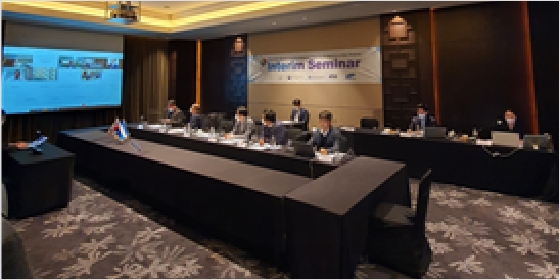
 Consultation Topics and Progress
Consultation Topics and Progress - Developing architecture and a roadmap for smart city in transportation, tourism, and safety areas and action plans to implement smart city infrastructure for transforming La Ceiba into a customized IT-based smart tourism city
- High ranking officials in Honduras including the Vice Minister of Office of Presidential Priorities and Public Innovation Mabel Sandres and Mayor of La Ceiba Jerry Sabio showed strong willingness to bilateral cooperation, laying the ground for the project’s success.
- Despite COVID-19 travel restrictions, high ranking officials from Honduras participated in all the phase of the project, confirming the high-level support for the project. As a result, at the virtual final reporting, both parties engaged in close discussion to pursue follow-up projects of the KSP policy suggestions.
-

 Tentative Outcomes
Tentative OutcomesReflecting partner country’s policy
- The government of La Ceiba had actively expressed opinions on the project from the initial stage of the project during pre-discussion and reiterated positive feedback on feasibility study application for continuing to the main project, boosting possibility of follow-up projects.
Innovation
Strengthening Capacity of Tax Policy for Serbia's Fiscal Development: Enhancing the Tax Administration
 Serbia
Serbia-
- Capital Belgrade
- GDP per Capita USD 7,721
- Area 87,460㎢
- Population 6.9 million
- Partner Institution Serbian Tax Administration

-

 Korea’s Relevant Experience
Korea’s Relevant Experience- The Korean Tax Service’s Neo Tax Integrated System (NTIS) was created by integrating ICT technology with the Tax authority’s expertise of e-taxation accumulated over two decades. By linking the NTIS to Hometax, Korea established an integrated tax administration system that made tax payment more convenient and tax administration more efficient.
-

 Background
Background- Committed to fulfill one of its top priorities, accession to the EU by 2025, the Serbian government aims to stabilize public finance by increasing tax revenue and the efficiency of public administration.
- The Serbian Tax Administration (STA) submitted a KSP project proposal to have access to Korea's experience in introducing ICT-based tax payment services and building a tax administration system that successfully integrated tax data sets. In the proposal, the STA also hoped to have its transformation of tax administration evaluated and set up guidelines for the centralization of tax functions.
-
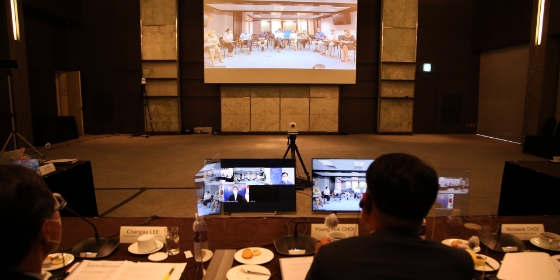
 Consultation Topics and Progress
Consultation Topics and Progress - Strengthening the centralization of tax functions in the STA
- Support for the enhancement of communication with Serbian taxpayers using ICT
- Evaluation of and suggestions for the human resource management system of the STA
- Director General Dragana Markovic of the STA and Assistant Director of Transformation Sector Rade Šević actively participated in the project and offered feedback on research findings and policy suggestions.
- The project was completed successfully based on flexible responses and active communication through videoconferencing, written Q&As, virtual interviews with the local chamber of commerce as well as tax accountants from the private sector.
-
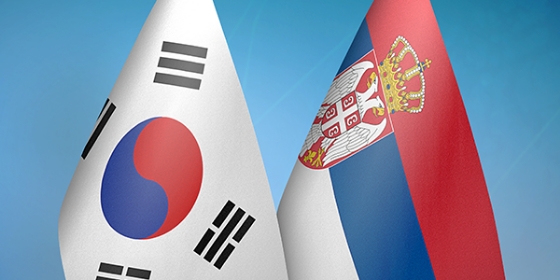
 Tentative Outcomes
Tentative OutcomesEnhancing development cooperation (follow-up actions in Korea)
- Follow-up technological support is scheduled under the 2022/23 Serbia KSP on the implementation of tax administration’s digitalization plan.
Outcomes reflected in the partner country’s national policy
- The STA requested the Ministry of Finance of Serbia, its superior agency, to draw up a new bill based on the KSP suggestion on securing legal grounds for the collection of taxpayer information (i.e. improvement in the legal and institutional frameworks concerning the collection of tax data).
- Another KSP recommendation on adding tax payment functions on the e-Taxes Portal (pre-filling, connection with the tax payment system, issuance of more types of electronic certificates, etc.) will be included in the mid- to long-term plan of the tax administration reform.
- The final consultation report, video report and key policy suggestions were all reported to the highest management body of the STA, the Transformation Committee, in March 2022. After a discussion on what can be done based on each policy suggestion, the final report was shared with the staff through the STA intranet.
The final report is confidential upon the request of the Serbian government
Innovation
Design and Implementation of Innovation Policies for SMEs
 Colombia
Colombia-
- Capital Bogota
- GDP per Capita USD 5,335
- Area 1,109,500㎢
- Population 50.88 million
- Partner Institution National Planning Department

-

 Korea’s Relevant Experience
Korea’s Relevant Experience- The government's support for R&D in priority industries; the promotion of around 50 industry-academia cooperation groups and of public-private cooperation by regional governments; the introduction of the technology rating system to foster innovative SMEs; the government's strong commitment for SME innovation and growth-policy financing, tax benefits, support for the introduction of smart factories to promote digitalization, etc.
-

 Background
Background- Only few of the Colombian SMEs, which represent 99% of the total enterprise, have managed to evolve into a large-sized or multinational company. Their insufficient capability for technological innovation has been cited as a key factor in Colombia's subpar national productivity.
- The National Planning Department (DNP, for its acronym in Spanish) submitted a KSP project proposal with the aim of gaining access to Korea's experience in strengthening innovative SMEs over the course of economic development and enhancing the growth potential of SMEs in Colombia.
-
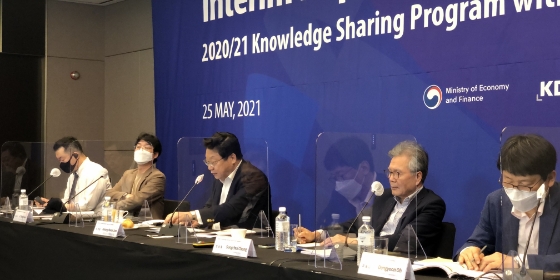
 Consultation Topics and Progress
Consultation Topics and Progress - Innovation policies for SMEs
- Policies on industry-academia linkage and public-private partnership for SMEs
- Financial support policies for SMEs
- Industries 4.0 and digital transformation of SMEs
- High-level Colombian officials including Daniel Gomez Gaviria, Deputy Director at DNP attended in the reporting sessions throughout the projects and reaffirmed continuous determination for a successful implementation of the project.
- The entire project cycle was conducted virtually with relevant institutions including the Presidential Council for Competitiveness. The KSP team held an online seminar titled "Innovation Policies for SMEs-Cooperation with Korea" at the special request of Deputy Director Daniel Gomez, who paid a visit to KDI.
-

 Tentative Outcomes
Tentative OutcomesConsultation reflected in the partner country’s policy making
- The Colombian government is considering the inclusion of KSP policy suggestions in the making of the 2022-2026 National Development Plan: selecting priority industries in R&D investment, adopting Korean-style Industry-Academia Linkage programs, and introducing Korea’s tax exemption policy for Industry 4.0-related fields, among others.
Policy networking strengthened
- Following a special request by Deputy Director Gomez during his visit to KDI, an online seminar titled “Innovation Policies for SMEs—Cooperation with Korea” was conducted on November 25, 2021. Representatives of 10 public institutions and around 20 SMEs joined the event.
Innovation
Strategic Plan of STPERI for Egypt
 Egypt
Egypt-
- Capital Cairo
- GDP per Capita USD 3,569
- Area 995,450㎢
- Population 102.33 million
- Partner Institution Ministry of Higher Education and Scientific Research, Electronics Research Institute

-

 Korea’s Relevant Experience
Korea’s Relevant Experience- Opened in 1973 as the only scientific city of Korea, Daedeok Science Town (DST) has developed to be a mecca for science and technology. After DST was transformed to Daedeok Innopolis in 2005, 4 more Innopolises and 12 Innotowns have been established across the country.
-

 Background
Background- The Egyptian government launched the ‘Egypt Makes Electronics (EME)’ initiative in a bid to spur scientific and technological innovation in the country. As part of the EME initiative, the Egyptian government set up the Science and Technology Park for Electronics Research and Industry (STPERI) in 2018 with the aim of promoting R&D and generating employment by helping enterprises to grow.
- As STPERI is scheduled to be in full operation by 2023, the Egyptian government submitted a KSP project proposal to draw up an effective management strategy for STPERI that encompasses R&D research, industry-university cooperation, and private connection. It also seeks to foster the electronics industry for the purpose of helping attract foreign investment.
-
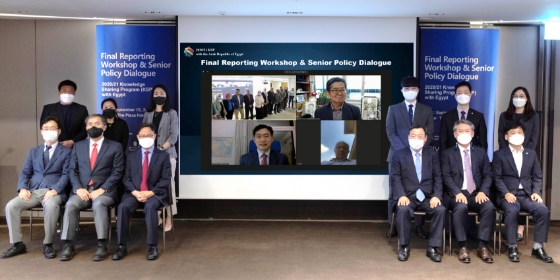
 Consultation Topics and Progress
Consultation Topics and Progress - Capability diagnosis and evaluation for strategic planning of STPERI
- Design of a sustainable structure and functions for STPERI
- A step-by-step development strategy for STPERI: a business model and the establishment of an industrial technology university
- With high-ranking participants from Egypt including Yasser Refaat, Deputy Minister of Scientific Research Affairs, Hesham Farouk, Assistant Minister of Higher Education & Scientific Research for Digital Transformation, and Hesham Eldeeb, then-President of the ERI, the basis for reliable project progress and continuous cooperation between the two countries was secured.
- The spread of the pandemic replaced face-to-face meeting with contactless activities. During the In-depth Study, researchers conducted a demand survey on STPERI with institutions relevant to the innovation ecosystem
-

 Tentative Outcomes
Tentative OutcomesPromoting development cooperation
- MoU between the ERI and Korea Innovation Foundation on a follow-up project (September 15, 2021)
Partnership
The 2021 KSP Dissemination Conference and Regional Seminar with Africa
“Navigating Green & Digital Transformation through Knowledge Sharing”
The 2021 KSP Dissemination Conference was held under the theme of 'Navigating Green & Digital Transformation through Knowledge Sharing'. At the 2021 Conference, participants discussed knowledge sharing not only in the context of green and digital transformation but also its role in finding a comprehensive solution for economic recovery and re-vitalization. Traditionally open to people in the international development cooperation community and the general public, the 2021 Dissemination Conference was held back-to-back with the Regional Seminar with Africa and the Knowledge Sharing Program Business Forum in a bid to strengthen partnership with African partner countries and with Korean enterprises.
Hong Nam-Ki, the then-Deputy Prime Minister and Minister of Economy and Finance of Korea, delivered opening remarks. He was joined by distinguished speakers including Professor of Chicago University and 2019 Nobel laureate in economic sciences Michael Kremer, Secretary-General Mathias Cormann of the OECD, President Hong Jang Pyo of the Korea Development Institute, and Minister Marcos Pontes of Science, Technology and Innovation of Brazil. Around 150 participants from 37 countries attended the meeting via live streaming, including representatives from the Asian Development Bank (ADB), the Inter-American Development Bank (IDB), the African Development Bank (AfDB), Korea Electric Power Corporation, and Samsung SDS, among others. Following the Dissemination Conference, a number of partner countries showed interest in joining the next project year's KSP. Ghana, a participant in the Regional Seminar, applied for a 2023/24 KSP project.
2020/21 KSP Research Projects
-
Regional Studies: India, Thailand, and Kenya
The 2021 Regional Studies feature India, Thailand, and Kenya. India, a major partner of Korea's New Southern Policy, and analyze the countries' political and economic situation in depth to recommend promising cooperation areas based on the analysis. The studies adopted new methodologies of growth accounting and the industry structure analysis based on the dual economy model in a departure from the previous reports.
※ The final report is available in Korean. For a summary in English, please download the annual report.
-
Trend Report: COVID-19 Response in New Southern Countries
The report focuses on the spread of COVID-19 in ASEAN and India (hereinafter called New Southern countries), their policy response, and how their cooperative ties with Korea have been affected. Offering latest information on a timely topic, the latest Trend Report can be used as a source material in planning and executing KSP projects in the region.
※ The final report is available in Korean. For a summary in English, please download the annual report.
-
Basic Analysis Study on Partner Countries
In consideration of Korea's international economic policy and its third version of ODA priority countries released in 2021, the 2020/21 Basic Analysis Study expanded its subject countries from 52 to 58. Also, to improve the publication's timeliness, researchers included latest information such as newly announced national development strategies and the preliminary project list for 2021 ODA. The following are features unique to the 2020/2021 study compared to previous issues.
※ The final report is confidential. For a summary of the research, please download the annual report.
-
Study on Improvement in KSP Projects to Enhance the Efficiency, Effectiveness, and Sustainability of e-Government Projects in Partner Countries
The study was conducted on how to improve KSP e-government projects in a way to secure the efficiency, effectiveness, and sustainability of those projects and further, to help Korean businesses and governments find more opportunities in this field where Korea has a competitive edge.
※ The final report is confidential. For a summary of the research, please download the annual report.

